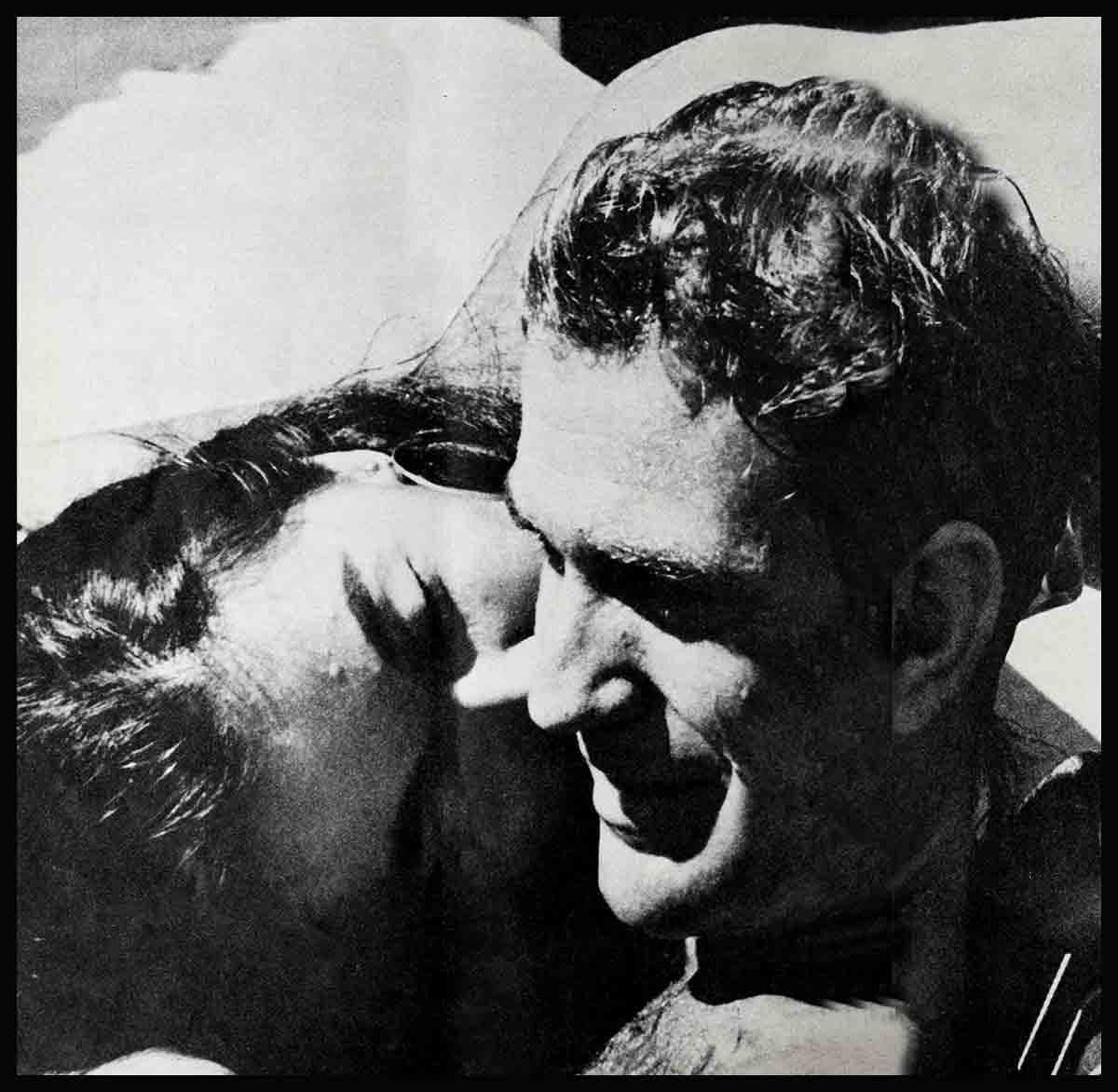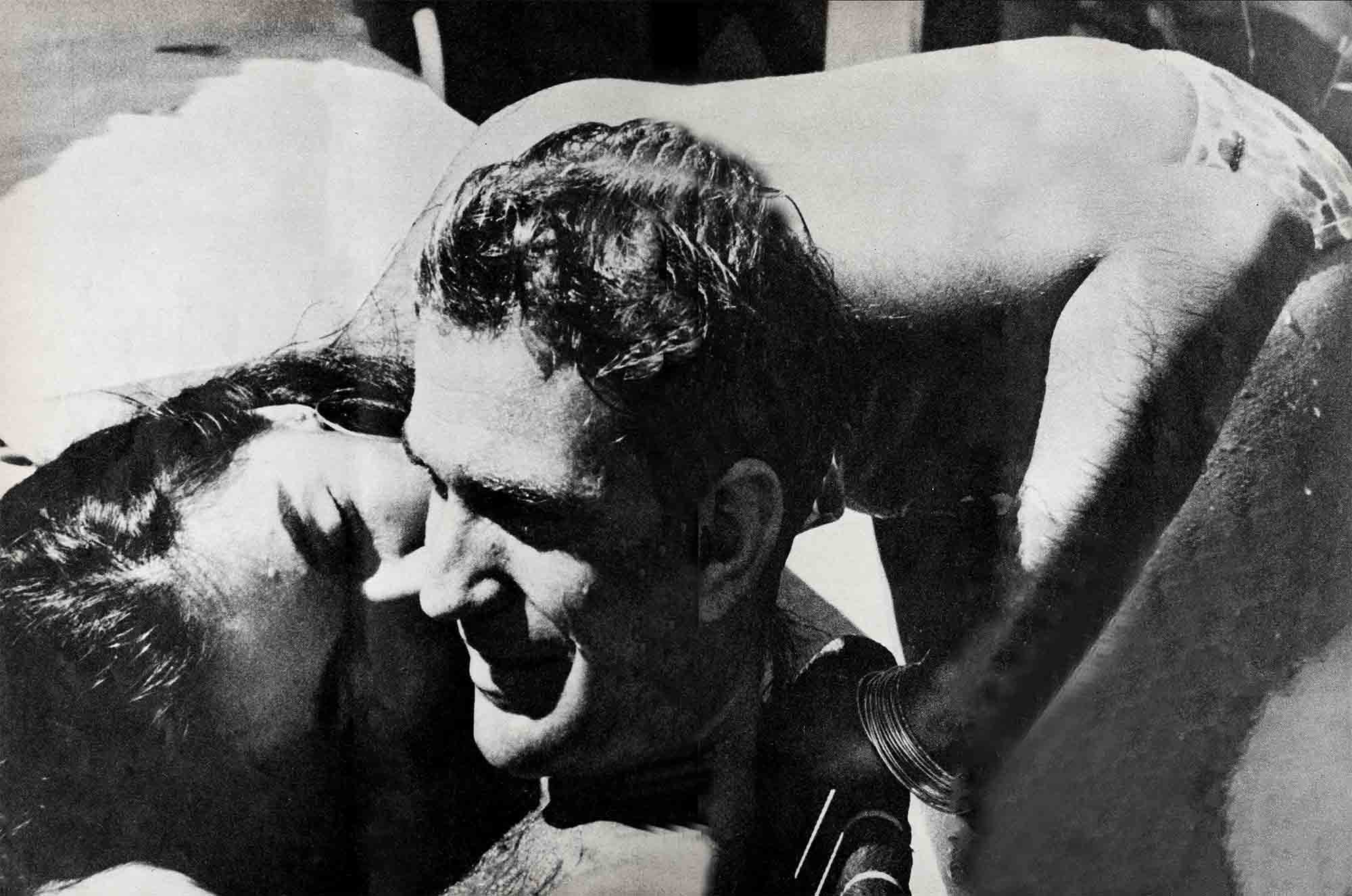
Look Who’s In The Mood For Love—France Nuyen & Rod Taylor
The marriage rumors get hotter and hotter. And for many reasons. Lazing around a pool, the sun warm on their bodies, they kissed openly. When they looked up to see that a camera had caught them at it, they were startled, but not embarrassed. Both are too honest for that. Instead, they invited the photographer to stay for dinner and he couldn’t help noticing how at-home France was in Rod’s kitchen . . . Other people were noticing things, too. Rod and France are seen everywhere together. They have dinner at Le Petit Jean, La Scala or the Captain’s Table, their heads close together, whispering softly. They seem to have a lot to say to each other and France wears a small secret smile these days. Other times they go horseback riding or they like to explore the beach above Malibu. They drive to Palm Springs to swim. “I’m teaching her.” Rod said. “France likes to be taught.” Wherever people spot them, it seems obvious this is a happy romance. Rod makes her laugh a great deal, as Marlon Brando never seemed to do when he was France’s steady date.
But if there’s a change in France, there’s an even greater one in Rod. Five years ago. he was a lonely guy in a strange town. He still remembers the Christmas Eve when he stared in the shop windows of Beverly Hills like a little lost boy. His family and friends had all been left behind in Australia and he was taking a gamble on a new life in the United States. He’d met only a few people and had made no friends yet.
He mooned about, until he recalled what George Stevens had told him while they were on location with “Giant” (one of Rod’s first small parts was as Liz Taylor’s fiancé).
“Hollywood’s nothing to be frightened of.” George Stevens said. “Don’t take these people—any people—at face value.”
The magic words
The words proved magic. They transformed lonely Rod into one of the happiest bachelors in town, with hundreds of friends. At least half of them are feminine. But he doesn’t forget and his heart went out to France when they met because, “I understood her feeling about a new country and a new people.” he said. “I’d been suspicious, too. and this girl had every reason . . .” She’d been through a heartbreaking experience in losing “The World of Suzie Wong”; now she was back trying to pick up her career. She was worried, too. about her mother who is ill in New York. Rod’s honesty, his ability to give her a down-to-earth trust and friendship, have helped her to a new lease on life.
Marriage? Not right now certainly. Rod has. he says, “too many selfish problems businesswise to inflict on anyone. It would be unfair.”
France is womanly enough to be interested in his work—he wants to keep active in both films and television, he dreams of producing and directing a la Burt Lancaster—and Rod is feeling the exhilaration of that. He’s given her enough confidence so that she’s not frightened of her own work any more either, and has become intrigued with it instead.
When the time comes, whoever gets Rod—and not even he denied that France was the most likely girl to be his bride—she’ll be getting one of the best catches in the country.
Rod is that rare phenomenon, a man about Hollywood who dates girls he works with without putting a strain on their working camaraderie (to the contrary), and who isn’t interested in the glamour of a surface relationship. He likes dining and dancing and all that, but he wants a girl who is intelligent enough to contribute something to the evening, a girl who could be a delight to face at breakfast.
He became intrigued with “Hong Kong, after turning down a dozen offered TV series, because of the Eastern flavor of the show. And it took him. of course, to Hong Kong which he found a marvelous city . . . “A city of fantastic, often tragic contrasts. In one street hundreds of people crammed together, a pregnant mother sleeping in a doorway, ragged children . . . then turn the corner and you might be on the most cosmopolitan street in San Francisco.” He found the Oriental people very, very friendly, the girls adorable. “They have style, they have a femininity. I think the cheongsam, with its high collar and side split, is the most dignified feminine dress in the world, tailored but sexy, too.”

An eye for girls
Of course, this bachelor has an eye for girls in any city. One of the things that began to make him glad to be in Hollywood is the fact that there are more beautiful girls per square inch than anywhere else in the world. Also there are comparatively few bachelors. “Both of which facts suit me just fine.” he grins.
“The one difference between the girls in this town and elsewhere.” he added, “is that they seem to rely a little too much on their beauty, they carry it almost like a banner and. armed with this, sometimes don’t worry enough about other aspects of their personalities.
“Obviously,” he admitted. “France does not fall into this category.”
Rod prides himself on his cookery. “An Australian bachelor can always cook.” he says. The specialty of his maison is what the English call Greek lamb, which is a lamb leg stuffed with cheese and garlic, basted with wine and served with a wine sauce in which are green and black olives. Long ago. Rod decided that carbohydrates were not for him. Heavily muscled, he feared weight that would make him appear bulky. He was a painter at that time. He’d studied painting and had a job at a store comparable to Magnin’s, painting backdrops for fashion displays. But his heart was in the theater and he felt so strongly about it that he gave up his department store job in favor of a night job (9:30 to 3 A.M. ) scrubbing floors in an insurance building—so he could be free daytime to act on radio shows.
Actor of the year
There was no television in Australia just then: but Rod graduated from radio to theater to films in such quick order that he became a sort of one-man dramatic revolution in Australia. The English traditions of acting were replaced virtually overnight, and in 1954 Rod was voted the coveted Rola Award as actor of the year. Then he met Marty Rakin, when “Long John Silver” was being made in Australia. “For kicks.” Rod says, he donned white contact lenses and played a mad old blind man, Israel Hans. Marty saw Rod in the theater as well, and felt he must come to Hollywood. So Rod came to America, quite prepared to pick up success exactly where he’d left it.
But life doesn’t always happen according to plan—and it didn’t now. Rod found the going tough. Okay, he decided. I’ll start from the bottom. Not via the party routine—he doesn’t dig big Hollywood parties—not via the contact routine, but by hard work. His first part was an off-stage voice on a TV show. Six weeks later, he starred on the same program. He has a strong jaw, this man, and a purpose to match.
From the time he was friendless, earless and getting lost on busses looking for work in a strange country, he made the transition gradually to the point where Hollywood noticed him. When TV series were finally offered, lie turned them down. This made everyone want him—“and it wasn’t just that I was so hot, it was that they wanted that son of a gun who wouldn’t do a series, who insisted on co-production.”
He got his series and at his standards. He has a contract for a film a year at M-G-M. He has the house in Cold Water Canyon neighboring Sinatra’s and Audrey Hepburn’s—which is merely a stop on the way to the house he wants but hasn’t had time to find. He has the Jaguar, the clothes, the friends, the girls—and maybe the girl. All that’s lacking is marriage, and his married friends are constantly trying to play Cupid.
But Rod is still a bit leary of marriage. Anyone with talent, he says, is in a constant inner turmoil, and in the younger stages of that turmoil, they’re impossible to live with. He works—or as he says, goes it—at a terrific clip. He’s dissatisfied with everything he does, and feels it could always be better. Until he’s more “cemented” in the business, there really isn’t adequate time for marriage. He scarcely has time for skin-diving or surfing, for hunting or swimming or tennis.
But behind this reluctance are scars that still linger from his first marriage. He was twenty-one at the time, and still a novice to the acting game in Australia. She was a beautiful girl, the first Mrs. Taylor, and a top model. The rock they foundered on was the clash of their separate careers—and the lack of maturity to deal with such a problem.
“Marriage,” Rod says, “takes complete cooperation at all times, and when you get two egos each fighting an outside war, there’s bound to be trouble. Someone has to give. If you go back to the basis of human society, the woman’s place is in the home. However clever she is, it’s the man who originally had to go out hunting the meat. A career woman can be a dream if she’ll put her personal life first, but this isn’t always so easy to do.” However, lie feels that Oriental girls—like France—do this naturally.
“There’s no reason two careers couldn’t work in a marriage if you really work at cooperating. The important thing in marriage is maturity. Youth, unfortunately, is the enemy of marriage. This wasn’t true perhaps in the olden days, but today there is so much excitement in living, so many new tensions, that you have to first be very sure of yourself.”
France believes in him
Youth was the enemy of his marriage, and Rod hasn’t forgotten it. He’s a sensitive guy afraid of getting hurt. But one thing is certain: France, who has been deeply hurt herself, will handle Rod’s heart gently if he’ll give her the chance. She’s no more a person who settles for surface values than he is. She has the Continental woman’s ability to be a man’s friend and the Oriental woman’s understanding. She can sit in a room and share a silence, she’ll spend a happy evening cueing him on a script, a happy Saturday being taught to swim. She believes in his talent, and when they sail into the bustle and limelight of a premiere, both of them essentially nervous, essentially shy, are reinforced and at peace—because they’re together.
This is a man with a dynamic potential. He values himself as a man and as an actor, and he’s not going to stop until he gets to the top. And one of these days, he’s going to forget the old wounds and be ready for love. He’s certainly in the mood.
THE END
—BY JANE AKDMORE
Be sure to see Rod in “Hong Kong.” on ABC-TV, Wednesdays at 7:30 P.M. EDT.
It is a quote. PHOTOPLAY MAGAZINE JULY 1961




